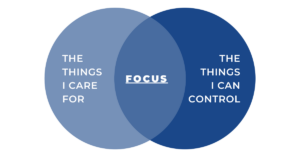
One of the things I’m most grateful for is a dinner I had earlier this year. While the food was fantastic, the memorable part of the dinner was the lesson I learned from a sage friend. Throughout our dinner, I had been airing my laments to my buddy. He stopped me and asked why most of our conversation was centered around things outside my control. I was worried about my parent’s health, my kids’ social lives, and whether the Fed would implement an appropriate interest rate policy. As we began to reconsider the evening’s conversation, I was struck that most of my angst focused on areas over which I had minimal influence. In fact, many of the things that kept me awake at night were entirely outside my control.
As we sat there, we shifted the conversation to things that really mattered to me. My friend suggested that I list the things that mattered the most in my life. This sounded like an easy task, and it was. My list included my wife and kids, other relationships, health, and faith. There were many other items on my list, but the reality is that my list probably looked a lot like everyone else’s. We established that this was a list of “things that matter.”
The following exercise was to write down everything I could control or had some degree of influence over. For instance, I have a fair amount of control over my health. I can eat healthily and exercise. I can visit a doctor for my annual visit and even go in for my scheduled blood work. (My apologies to Dr. Higgs for skipping that step this past year.) I could also influence the amount of time I spend with my kids, although I have less and less control over their time as they age. The list of things that I control grew surprisingly long! I manage the thermostat in my house. I choose whether or not the grass gets watered. I decide how fast I drive. The list was pretty long, and I eventually got tired of writing.
He then stopped and drew two overlapping circles that looked like this:

I recalled seeing this simple picture several times over the years. It was a good reminder that I spend an enormous amount of emotional energy on things I care about but have no control over. It was also apparent that I have tremendous control over things I don’t care about, such as the thermostat. I genuinely care about a limited number of items where I have influence or even control. I decided to focus my energy on these things.
I think that this is a helpful lesson during this season of thanksgiving. Many things are outside of our control. The past has already happened. We don’t have a time machine that will allow us to undo past mistakes. However, we can be grateful for the time we have today to chart a new course into the future. For instance, we can stop lamenting that we haven’t saved enough for retirement and instead work to find ways to increase what we are saving today. Instead of worrying about what future market conditions might do to our retirement plans, we can focus on being prepared for various possible outcomes. Instead of wishing we had participated in our alma mater’s last fundraising campaign, we can focus on creating a generous legacy.
We can expend an enormous amount of energy focusing on things beyond our control and miss the opportunity to make tangible adjustments today. Making these adjustments is a subtle act of gratitude for the time you still have available to impact the world around you. This impact may benefit both you and others. This season is a time to slow down and reflect, to be thankful for all that we have and find clarity in the vision we have for our life and legacy.

Author: Michael French, Senior Vice President of Investments